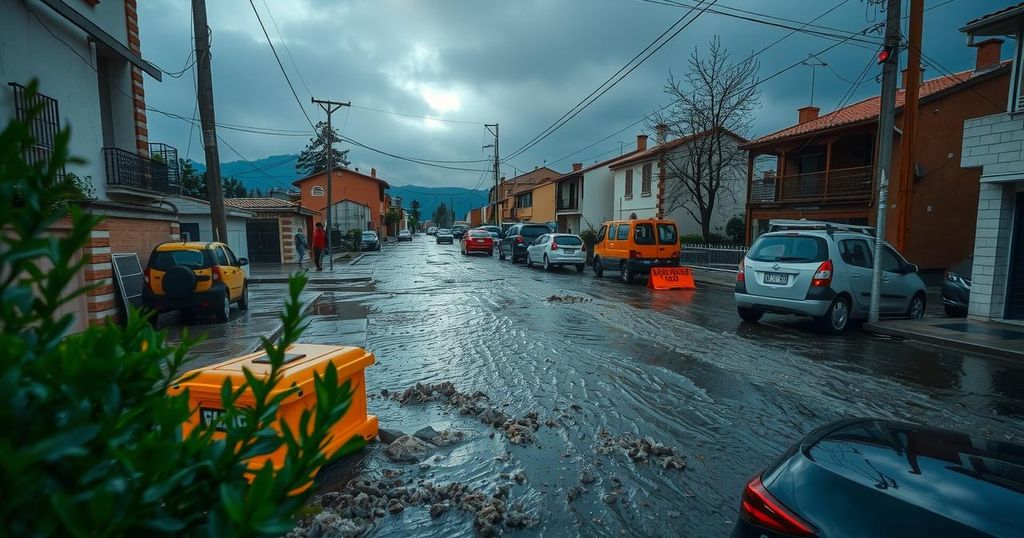Tragic Flash Floods in Spain: Unprecedented Disaster Claims 158 Lives

On October 31, 2024, unprecedented flash floods in eastern Spain resulted in at least 158 fatalities, primarily in the Valencia region. Triggered by extreme rainfall attributed to climate change, the floods caught residents off guard, leading to widespread destruction and complicating recovery efforts. Authorities are conducting search operations for missing individuals amidst a mounting humanitarian crisis.
In eastern Spain, a devastating flash flood event occurred on Tuesday, resulting in at least 158 fatalities due to heavy rainfall. The storm, described as Spain’s deadliest in recent history, unleashed torrents of water that overwhelmed many unsuspecting individuals returning from work. Most casualties were reported in the Valencia region, where conditions deteriorated rapidly, leaving thousands with destroyed homes and livelihoods. Recovery efforts commenced shortly after the disaster, but the extent of damage was severe, with many victims tragically trapped in vehicles and residences. Root causes of this catastrophic flooding are attributed to climate change, notably an unusually warm Mediterranean Sea and disrupted atmospheric patterns, adding this event to a troubling trend of extreme weather phenomena exacerbated by human activities. In Valencia, the storm primarily affected the Magro and Turia river basins, where unprecedented rainfall developed in mere minutes. Eyewitness accounts reveal that roads transformed into torrents, forcing individuals to seek refuge on rooftops or higher ground as cars became submerged. The national meteorological service reported that in the municipality of Chiva, the rainfall within eight hours exceeded totals from the previous twenty months—termed an “extraordinary” deluge. Authorities have increased their search for an undetermined number of missing persons as cleanup efforts continue amidst challenging conditions, including widespread power outages and water shortages. The rapid onset of the floods caught many off guard, resulting in tragic losses, as emergency alerts sent to mobile devices reached too late for those trapped in vulnerable locations. This catastrophic weather event has raised questions regarding the connection between climate change and increasing occurrences of severe flooding. Researchers highlight warmer air’s capacity to hold more moisture and a meandering jet stream as contributing factors to the extreme precipitation. Notably, the Mediterranean has recorded exceptionally high water temperatures that may further enhance such storms. Experts noted a concerning trend of alternating droughts and floods, which, in light of these recent developments, may become more pronounced. While autumn storms along Spain’s Mediterranean coast are not unusual, this event marks an unprecedented escalation in intensity and impact, surpassing even the historically significant floods of 1957. The devastation experienced throughout Valencia serves as a grim reminder of the vulnerabilities inherent in climate change, prompting urgent discussions regarding preparedness for future weather-related disasters. As recovery efforts persist, the focus remains on identifying those missing, assisting victims, and reflecting on the broader implications of this tragedy for Spain and beyond.
The flash floods in Spain represent a significant environmental disaster, exacerbated by climate change often manifesting as extreme weather patterns. These events, once viewed as isolated incidents, have increasingly become the norm as scientific consensus aligns on the influence of human activity on the planet’s climate systems. The recent flooding, characterized by rapid onset and extensive damage, has sparked discussions about the urgent need for climate adaptation strategies, emergency preparedness, and improved weather forecasting systems to safeguard vulnerable communities in the future.
In summary, the flash floods in eastern Spain have resulted in a devastating loss of life, with 158 confirmed deaths, particularly impacting the Valencia region. This tragedy has been attributed to intense rainfall exacerbated by climate change, revealing significant vulnerabilities in the region’s preparedness for such extreme weather events. As recovery efforts continue, it is imperative to address the underlying causes linked to climate change and enhance measures to mitigate the impacts of future disasters.
Original Source: apnews.com








